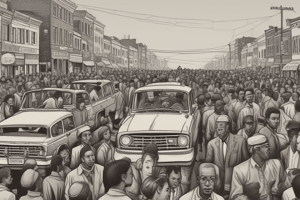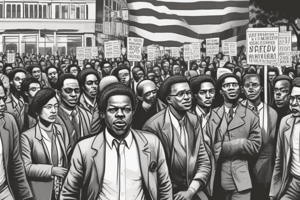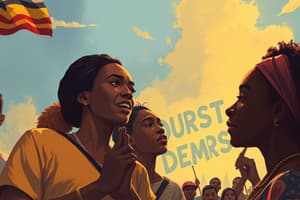Podcast
Questions and Answers
What was the Non-Cooperation Movement also known as?
What was the Non-Cooperation Movement also known as?
- Boycott Movement
- Civil Disobedience Movement (correct)
- Revolutionary Act
- Resistance Campaign
Which event served as a significant inspiration for the Non-Cooperation Movement?
Which event served as a significant inspiration for the Non-Cooperation Movement?
- Montgomery Bus Boycott (correct)
- French Revolution
- Industrial Revolution
- World War II
What was the outcome of the Brown v. Board of Education case?
What was the outcome of the Brown v. Board of Education case?
- Ruled segregation in public schools unconstitutional (correct)
- Established segregation as constitutional
- Advocated for separate but equal schools
- Segregation in schools was considered valid
Which prominent figure delivered the 'I Have a Dream' speech during the March on Washington for Jobs and Freedom?
Which prominent figure delivered the 'I Have a Dream' speech during the March on Washington for Jobs and Freedom?
When did the Non-Cooperation Movement take place?
When did the Non-Cooperation Movement take place?
What was the main type of protest during the Freedom Rides?
What was the main type of protest during the Freedom Rides?
'Separate but equal' schooling was advocated by which historical case overturned by Brown v. Board of Education?
'Separate but equal' schooling was advocated by which historical case overturned by Brown v. Board of Education?
Which individual was not directly involved in leading the Non-Cooperation Movement?
Which individual was not directly involved in leading the Non-Cooperation Movement?
Which event directly followed the arrest of Rosa Parks and subsequently fueled the Non-Cooperation Movement?
Which event directly followed the arrest of Rosa Parks and subsequently fueled the Non-Cooperation Movement?
The key theme of the Non-Cooperation Movement was primarily focused on:
The key theme of the Non-Cooperation Movement was primarily focused on:
Flashcards are hidden until you start studying
Study Notes
Non-Cooperation Movement
The Non-Cooperation Movement, also known as the Civil Disobedience Movement, was a mass civil disobedience campaign against racial segregation laws led by Thurgood Marshall, Charles Hamilton Houston, and others from February 1947 until June 1968. This movement took place in the United States during the Civil Rights Movement of the mid-twentieth century.
Origins
The origins of this movement can be traced back to the Montgomery Bus Boycott, which was triggered by the arrest of Rosa Parks on December 1, 1955. The boycott lasted over a year, and it was a major victory in the struggle against racial segregation. The movement also drew inspiration from Mahatma Gandhi's nonviolent resistance campaigns in India.
Key Events
Some key events of this movement include:
- Brown v. Board of Education (1954): This landmark Supreme Court decision ruled that segregation in public schools was unconstitutional, effectively overturning the Plessy v. Ferguson decision of 1896.
- Montgomery Bus Boycott (1955-1956): As mentioned earlier, this was a major victory in the struggle against racial segregation.
- Freedom Rides (1947-1961): These were organized protests against segregation in interstate travel facilities.
- March on Washington for Jobs and Freedom (1963): This was a pivotal event in the civil rights movement, featuring Martin Luther King Jr.'s famous "I Have a Dream" speech.
Impact
The Non-Cooperation Movement had a significant impact on the Civil Rights Movement and American society as a whole. It helped to bring about major legal and social changes, including the end of legal segregation and the implementation of civil rights laws. However, the movement also faced significant challenges and opposition, with many people resisting the changes and violence often accompanying the movement.
In conclusion, the Non-Cooperation Movement was a crucial part of the Civil Rights Movement in the United States. It was a prolonged campaign of civil disobedience that helped to bring about significant legal and social changes. Despite facing challenges and opposition, the movement's impact is still felt today, as it paved the way for a more equal and just society.
Studying That Suits You
Use AI to generate personalized quizzes and flashcards to suit your learning preferences.




